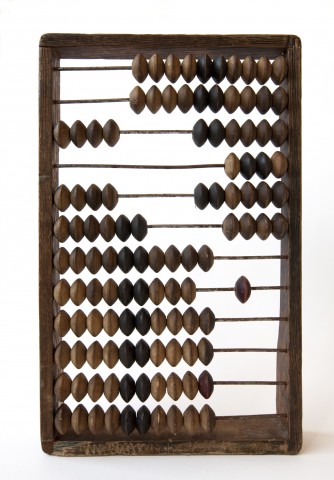Especially if you’re planning a prolonged visit to Kenya, using the correct Swahili numbers for counting in Swahili could be very important! Number systems are the other alphabet in any language. In fact, it is a language all of its own, and it serves a multitude of excellent purposes.
Table of Contents
- A Brief History of Counting and Number Systems
- Why is it Important to Learn Swahili Numbers?
- Learning Swahili Numbers
- Why Choose SwahiliPod101 to Learn all about Swahili Numbers?
1. A Brief History of Counting and Number Systems
1. The Ishango Bone
The origin of counting, and with it numbers, is not clear to historians. While their art showed that prehistoric man had a concept of numbers, the first indication of a formal system was found to be only between 20,000 and 35,000 thousand years old. This discovery came around 1960 in the form of the so-called Ishango Bone found in the Congo, Central Africa.
The 10cm/4 inch piece of bone was a fibula from a baboon. It showed markings with a neat, unified pattern of small lines – far too organized and sophisticated to have formed spontaneously. Archeologists believe that those thin markings were carved to keep score of, or count, something. The lines seemed to represent a sequence of prime numbers and a series of duplications. Some even called it the first-ever pocket calculator!
2. Mesopotamia and Greece
Yet, evidence suggests that it wasn’t until about 4,000 years ago that humans truly started counting and using numbers. Together with the development of civilization came developed agriculture, and the need for measurement and score-keeping was increased.
For this reason, a formal number system and mathematics were developed first in the Middle East, in what was then called Mesopotamia. Mesopotamia was roughly situated in the area of modern-day Iraq and Kuwait. Allegedly, the system was pretty simple at first. Citizens used tokens that represented a certain number of items, such as one token equalling four goats, etc. This eventually evolved into a system of score marks pressed into clay, which ultimately went on to influence Greek mathematics.
3. Hindu-Arabic Numbers
Zero, meanwhile, was conceived later and elsewhere. Inspired by the Hindu religion, which allows for the concept of infinity and eternity, the Indians invented a symbol to represent nothing. The magic of the zero lies not in itself but its combination with other numbers.
The Indians were also the creators of today’s numbers, which are often referred to as Hindu-Arabic numbers. These comprise one or a combination of just ten symbols or digits: 1, 2, 3, 4, 5, 6, 7, 8, 9, and 0.
Europe learned of this numeric system only around 1200 A.D., when they were introduced to it by an Italian mathematician called Leonardo Pisano Bigollo.
Pisano, also known as Fibonacci, is famous for the discovery of a mathematical sequence with countless applications. Yes, math buffs, it’s the well-known Fibonacci sequence, also called the Golden Mean.
The Roman numeric system, which was clumsy next to the newer inventions, gradually lost popularity in the West. It’s from here that they “slowly spread to conquer the world,” as Steven Law puts it.
2. Why is it Important to Learn Swahili Numbers?
For us at SwahiliPod101, this is an easy question to answer! Because we know that numbers are a global unifier.
Counting and numbers have made our lives easier since they were first formulated, even in their most primitive forms.
Without knowing your numbers, you can’t properly communicate about or deal with the following:
1) Your date/time of birth, i.e., your age: This is vital information to be able to give to people like doctors, employers, law enforcement, and so forth.
2) Banking: Worldwide, our monetary systems are built on numbers. Interest, credit scores, and loans all rely on math beyond simple finger counting.
3) Time: Without knowing how to say numbers, you can’t talk or ask about the time and expect to get a useful response. You don’t want to miss an appointment or schedule something for the wrong hour!
4) Ordering data: Numbers bring order to a mostly random life! Scientists even say that numbers and the way they are organized underpin the whole universe. From using them to count your meals’ calories and the number of likes your posts get on social media, to drawing up intricate data charts and explaining existence itself – numbers are what makes these things possible.
All of the above and more are reasons why it is important to know your numbers if you plan on travelling or becoming a foreign worker abroad, in Kenya or anywhere else!
3. Learning Swahili Numbers
Now, let’s explore the Swahili number system a bit more! Take a look at this infographic.
Can you make out for yourself what the Swahili numbers between one (1) and nine (9) look and sound like? Easy, right?
Or, if you struggled a bit, no problem. Why not listen to how Swahili numbers one (1) through ten (10) sound when pronounced by our native Swahili speaker and friendly SwahiliPod101 teacher?
Then, share with us in the comments your native language’s romanized pronunciation of your number system. We’d love to see all the different ways the same numbers can be pronounced!
When you have mastered the first ten numbers, you have basically nailed the most significant part of the number system. Well done! Curious to learn the numbers from eleven upward? No problem! Why not subscribe and enroll with us now to immediately enjoy this lesson, teaching you all about Swahili numbers eleven (11) to one hundred (100)?
Finally, if you’re curious how the numbers look once you’ve broken one hundred, why not check out our Swahili number vocabulary page? You can see the numbers we’ve just covered, all the way up to four thousand (4,000). Plus, you can also see the Swahili words for different numbers used in example sentences, to get an idea of how you can use them in your day-to-day conversations!
4. Why Choose SwahiliPod101 to Learn all about Swahili Numbers?
SwahiliPod101, like all Innovative Language Learning ventures, takes the pain out of learning a new language by adding a lot of fun. It’s never an easy thing to learn a new language, but we formulated all your lessons so they’re nicely bite-sized, and geared to keep you motivated!
Also, we created a great number of fantastic tools to help keep struggle and boredom out of the learning process.
- Fun and Easy Learning: It’s a commonly-known fact that when learning is made easy and fun, student motivation rises. And as motivation rises, so does the effort to learn – what a beautiful cycle! SwahiliPod101’s language learning system is designed to get you speaking from the onset. Learn at your own convenience and pace with our short, effective, and fun audio podcast lessons. Our Learning Center is comprehensive and state-of-the-art, with a vibrant user community to connect with! Our lessons are recorded with native hosts and voice actors, providing a diverse range of dialects in your lessons. You can be confident that native speakers will understand you when speaking Swahili!
- Innovative Learning Tools and Apps: We make it our priority to offer you the best learning tools! These include apps for iPhone, iPad, Android, and Mac OSX; eBooks for Kindle, Nook, and iPad; audiobooks; Roku TV and so many more. This means that we took diverse lifestyles into account when we developed our courses, so you can learn anywhere, anytime on a device of your choice. How innovative!
- Free Resources: Sharing is caring, and for this reason, we share many free resources with our students. For instance, start learning Swahili with our basic online course by creating a lifetime account – for free! Also get free daily and iTunes lessons, free eBooks, free mobile apps, and free access to our blog and online community. Or how about free Vocabulary Lists? The Swahili dictionary is for exclusive use by our students, also for free. There’s so much to love about SwahiliPod101…!
- Live Hosts and One-on-One Learning: Knowledgeable, energetic hosts present recorded video lessons, and are available for live teaching experiences if you upgrade. This means that in the videos, you get to watch them pronounce those tongue-twisters as if you’re learning live! Add octane to your learning by upgrading to Premium Plus, and learn two times faster. You can have your very own Swahili teacher always with you, ensuring that you learn what you need, when you need to – what a wonderful opportunity to master a new language in record time!
- Start Where You Are: You don’t know a single Swahili word? Not to worry, we’ve absolutely got this. Simply enroll in our Absolute Beginner Pathway and start speaking from Lesson 1! As your learning progresses, you can enroll in other pathways to match your Swahili level, at your own pace, in your own time, in your own place!
So, why wait? Sign up with SwahiliPod101 right away! Also, let us know in the comments if you’ve used this blog post, or any of the free lessons anywhere to master Swahili numbers. Or, even better – share your birthdate using what you’ve learned!
















